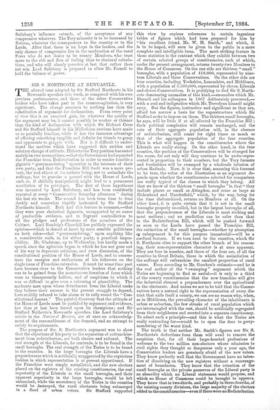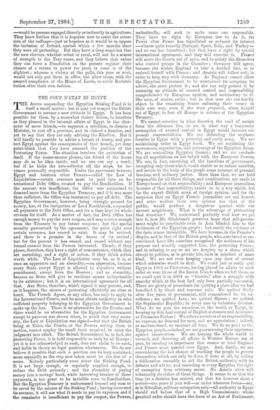SIR S. NORTHCOTE AT NEWCASTLE.
rEaltered tone adopted by Sir Stafford Northcote in his Newcastle speeches this week, as compared with his own previous performances, and those of the other Conservative leaders who have taken part in the counter-agitation, is very significant. The change amounts to nothing less than the substitution of argument for declamation. From every point of view this is an unmixed gain, for whatever the quality of the argument may be, it cannot possibly be weaker or thinner than the kind of declamation with which Sir Richard Cross and Sir Stafford himself in his Midlothian orations have made us so painfully familiar, while it has the immense advantage of offering something tangible and definite for friends to grasp and opponents to grapple with. Nor is it difficult to under- stand the motives which have suggested this sudden and salutary change of attitude. Hitherto the Tory position has rested mainly on two assumptions,—that the Government had separated the Franchise from Redistribution in order to render feasible a gigantic " gerrymandering " operation in the interests of their own party, and that the Franchise Bill itself was a mere pre- text, the real object of its authors being, not to assimilate the suffrage, but to provoke a quarrel with the House of Lords, such as, if skilfully manipulated, might lead to a permanent mutilation of its privileges. The first of these hypotheses was invented by Lord Salisbury, and has been confidently repeated at every "Conservative Saturday afternoon" during the last six weeks. The second has been from time to time darkly and somewhat timidly insinuated by Sir Stafford Northeote himself. Both had this feature in common,—that they were pure rhetorical figments' unsupported by an ounce of producible evidence, and in flagrant contradiction to all the pledges and professions of the members of the Cabinet. Lord Randolph Churchill has publicly expressed the opinion—which is shared at heart by most sensible politicians on both sides—that "gerrymandering," upon anything like a considerable scale, is, for either party, a practical impos- sibility. Mr. Gladstone, up to Wednesday, has hardly made a speech since the agitation began in which he has not gone out of his way to deprecate criticism, and even discussion, of the constitutional position of the House of Lords, and to concen- trate the energies and enthusiasm of his followers on the single issue of Franchise extension. It must for some time past have become clear to the Conservative leaders that nothing was to be gained from the monotonous iteration of fears which were so transparently hollow, and of suspicions to which it was so difficult to give even a colouring of plausibility. The moderate men upon whose detachment from the Liberal ranks they believe their success in the present struggle to depend, have stolidly refused to take alarm or to rally round the "Con- stitutional banner." The painful discovery that the attitude of the House of Lords must be justified by argument and evidence, has thus at last been forced upon its champions ; and Sir Stafford Nothcote's Newcastle speeches, like Lord Salisbury's article in the National Review' are at once an acknowledg- ment of the reasonableness of the demand, and an attempt to satisfy its requirements.
The purpose of Sir. S. Northcote's argument was to show that the objections of his party to the separation of enfranchise- ment from redistribution, are both sincere and rational. The real strength of the Liberals, he contends, is to be found in the small boroughs. The real strength of the Tories is to be found in the counties. In the large boroughs the Liberals have a preponderance which is artificially exaggerated by the capricious fashion in which representation is at present apportioned. If the Franchise were simply assimilated, and the new electors placed on the registers of the existing constituencies, the real superiority of the Liberals in the small boroughs, and their apparent superiority in the large boroughs, would be left untouched, while the ascendency of the Tories in the counties would be destroyed, the rural electorate being submerged in a flood of urban voters. Sir Stafford supported this view by copious references to certain ingenious tables of figures which had been prepared for him by "his excellent friend, Mr. W. H. Smith," and which, it is to be hoped, will soon be given to the public in a more complete and intelligible form. The most striking feature in these statistics is the contrast which they exhibit between two of certain selected groups of constituencies, each of which, under the present arrangement, returns twenty-two Members to the House of Commons. On the one side are thirteen " small " boroughs, with a population of 418,000, represented by nine- teen Liberals and three Conservatives. On the other side are four counties, including Yorkshire, Lancashire, and Middlesex, with a population of 3,500,000, represented by eleven Liberals and eleven Conservatives. It is gratifying to find Sir S. North- cote denouncing anomalies of this kind,—anomalies which Mr. Disraeli and his colleagues in 1867 deliberately preserved,— -with a zeal and indignation which Mr. Trevelyan himself might envy. But the figures, instructive and significant as they are, afford too narrow a basis for the superstructure which Sir Stafford seeks to impose on them. The thirteen small boroughs, he says, will be little if at all affected by the Franchise Bill ; their political complexion will remain unchanged, and the vote of their aggregate population will, in the absence of redistribution, still count for eight times as much as that of the aggregate population of the four counties. This is what will happen in the constituencies where the Liberals are really strong. On the other hand, in the four counties, the position of the Conservatives will be changed for the worse, for not only will they continue to be under-repre- sented in proportion to their numbers, but the Tory farmers and freeholders will be swamped by a wholesale infusion of urban Radicals. Now, it is clear that, assuming this forecast to be true, the value of the illustration as an argument de- pends upon whether the constituencies selected for comparison are really typical of the classes to which they belong. All that we know of the thirteen "small boroughs "is, that" they include places as small as Abingdon, and some as large as Birkenhead and Macclesfield," which, by the way, being for the time disfranchised, returns no Members at all. On the other hand, it is quite certain that it is not in the small boroughs properly so-called, but in the largest boroughs of all, that the preponderance of the Liberals is most striking and most uniform ; and no prediction can be safer than that in the Redistribution Bill, which will be pushed forward as soon as the Lords have passed the Franchise Bill, the extinction of the small boroughs—whether by absorption or enlargement is for this purpose immaterial—will be a cardinal feature. If we turn next to the counties, which Sir S. Northcote cites to support the other branch of his reason- ing, their non-representative character is at once apparent. They are four in number, and three of the four are, of all the counties in Great Britain, those in which the assimilation of the suffrage will enfranchise the smallest proportion of rural voters. Even according to Mr. Goschen's estimate—and he is the real author of the " swamping " argument which the Tories are beginning to find so useful—it is only in a third of the county constituencies that the new franchise will give the industrial element a preponderance over the agricultural in the electorate. And unless we are to be told that the Conser- vatives have a natural right to the representation of every dis- trict that calls itself a county, we can see no reason why, when, as in Middlesex, the prevailing character of the inhabitants is urban or suburban, the few streaks of rural population which are intermingled with the rest, should be artificially segregated from their neighbours and erected into a separate constituency. To admit such a principle—and this is what the Tories are really contending for—would be to open the door to gerry- mandering of the worst kind.
The truth is that neither Mr. Smith's figures nor Sir S. Northcote's deductions from them will avail to remove the suspicion that, for all their large-hearted professions of welcome to the two million non-electors whose admission to civil rights they thought so dangerous only a year ago, the Conservative leaders are genuinely afraid of the new voters. They know perfectly well that the Government have no inten- tion of dissolving on the new registers without a rearrange- ment of boundaries. They know that the retention of the small boroughs as the private preserves of the Liberal party is an absurdity which no Liberal statesman would propose, and which no House of Commons could be brought to approve. They know that in two-thirds, and probably in three-fourths, of the existing county divisions, the large majority of the electors added to the constituencies—even if there were no Redistribution —would be persons engaged directly or indirectly in agriculture. They know further that it is hopeless now to resist the exten- sion of the suffrage—just as hopeless as it would be to oppose the inclusion of Ireland, against which a few months since they were all protesting. But they have a deep suspicion that the new electors, whether urban or rural, will not be a source of strength to the Tory cause, and they believe that unless they can force a Dissolution on the present register their chance of a return to power for years to come is of the slightest ; whereas a victory at the polls, this year or next, would not only put them in office, but allow them, with the assured compliance of the House of Lords, to settle Redistri- bution after their own fashion.

































 Previous page
Previous page